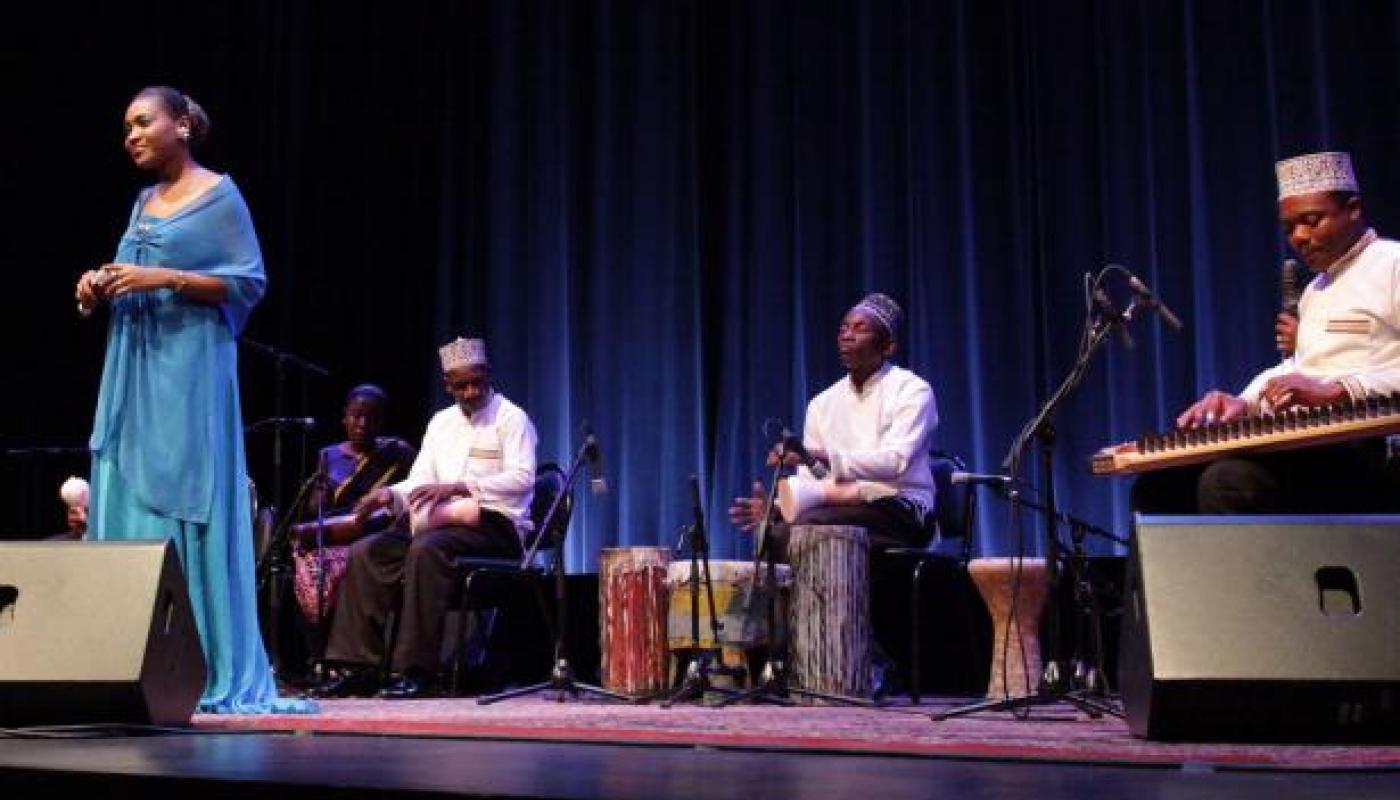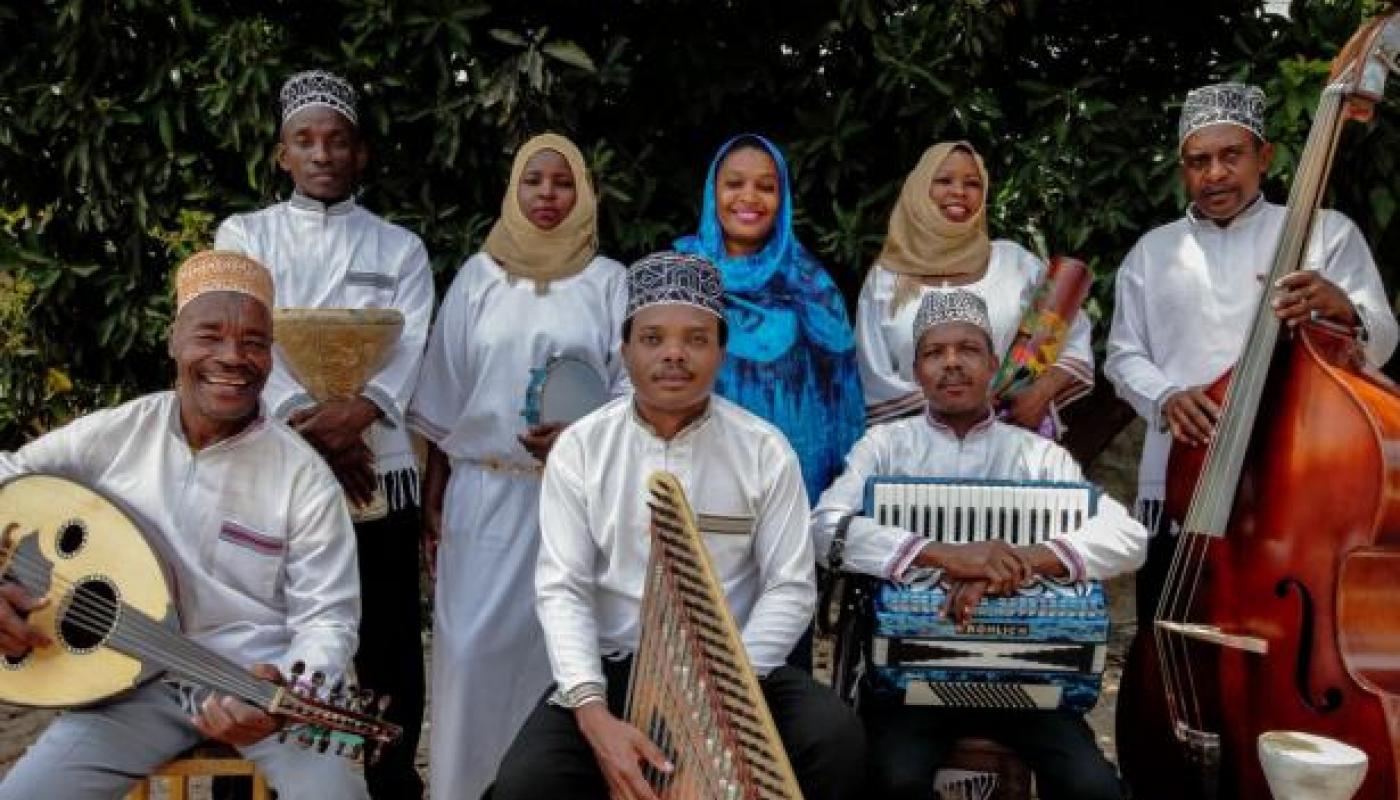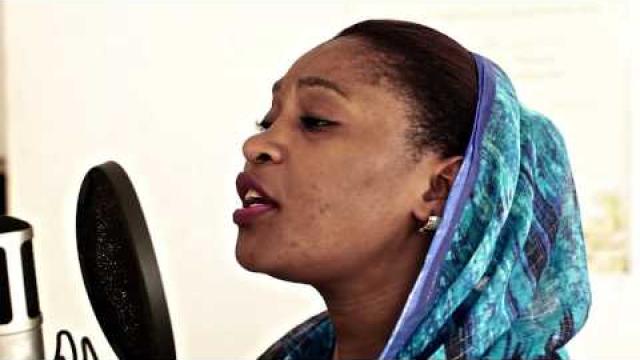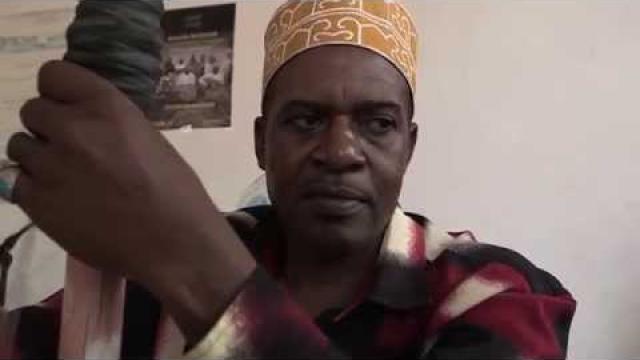
Rajab Suleiman & Kithara


A renewed taarab reinvigorates Zanzibar's syncretic signature sound
Taarab music has defined Zanzibar's aural landscape for over a century, renowned for its lush mix of Arabic and western instruments, diva-worthy vocalizations, and allusive Swahili lyrics. The venerable and syncretic form is ambitiously renewed by Rajab Suleiman & Kithara. This lean and nimble group has uncovered the form's essential origins and is creating new musical conversations with its East African neighbors, historic Arabic cultural partners, and allied Western forms. "A dazzling album. Gloriously and richly acoustic, with deft real-time interplay and magnificent singing." (Chicago Reader, 2015)
Videos
Without nostalgia or sentimentality, [Kithara] renews the scintillating taarab in all its acoustic subtlety and enchantment.
Lesinrocks.com (France)
U.s. debut Center stage tour overview
Washington, DC - September 4-7
- Rajab Suleiman & Kithara began their Center Stage tour in Washington, DC. In addition to sight-seeing and a welcome from the State Department, they performed at the Kennedy Center Millennium Stage on Tuesday September 6, 2016.
Lewisburg, PA - September 8-10
- The sounds of Zanzibar traveled to rural Pennsylvania where they performed at the Weis Center Plaza on Friday, September 9, 2016.
- During their residency, the group visited an Imagining Africa class with Professor Cymone Fourshey.
Blacksburg, VA - September 11-13
- Rajab Suleiman & Kithara traveled south to Virginia for a multi-day residency at Virginia Tech. September 12, 2016, the band had a joint workshop with Itraab Ensemble.
- They performed at the Moss Arts Center on September 14, 2016.
Madison, WI - September 15-16
- Then on to the Midwest where they were hosted by the Madison World Music Festival. Rajab Suleiman & Kithara participated in a workshop at a community center with children ages 5-13. They performed on September 16, 2016 at the festival's Memorial Union Terrace.
Chicago, IL - September 17-21
- The group participated in World Music Festival Chicago. They performed on Sunday, September 18, 2016 at the Humbdolt Park Boathouse as part of the Festival’s Global Peace Picnic along with Rocky Dawuni (Ghana/USA), Herencia de Timbiquí (Colombia).
- Rajab Suleiman & Kithara engaged in community activities and workshops hosted by Old Town School of Folk Music on September 20, and performed on September 21, 2016 at the Gary and Laura Mauer Hall.
Albuquerque, NM – September 23-25
- The band finished off their Center Stage tour in the Land of Enchantment at Globalquerque!, New Mexico’s annual celebration of world music. They performed on September 23, 2016 at the National Hispanic Cultural Center.
- On September 24, 2016 the band participated in a demonstration/Q&A on distinct instruments and music of their region before their final performance.
Press
Chicago Reader: The best of the 2016 World Music Festival
2016 Program Notes and Bios
Rajab Suleiman & Kithara
Stone Town, Zanzibar, Tanzania
U.S. debut tour as part of Center Stage
Rajab Suleiman Leader, Qanun, Accordion
Saada Nassor Vocals, Percussion
Makame Faki Oud, Vocals
Mohamed Hassan Accordion, Kidumbak
Daud Shadhil Double Bass, Electric Bass, Sanduku
Foum Faki Dumbak, Bongos, Ngoma, Kidumbak
Amina Yusuf Percussion, Dancer, Backing Vocals
Malitina Hassan Percussion, Dancer, Backing Vocals
Taarab music has defined Zanzibar's aural landscape for over a century, renowned for its lush mix of Arabic and western instruments, diva-worthy vocalizations, and allusive Swahili lyrics. The venerable and syncretic form is ambitiously renewed by Rajab Suleiman & Kithara. This lean and nimble group has uncovered the form's essential origins and is creating new musical conversations with its East African neighbors, historic Arabic cultural partners, and allied Western forms.
In the form’s heyday, taarab orchestras could include 60 or more musicians: violinists, singers, qanun, accordion, and oud players. During the last 20 years, synthesizers and drum machines displaced musicians. Virtuosity--and audiences--were lost.
To revive the form’s striking colors, Suleiman and a few younger players broke off from the venerable Culture Music Club in 2012 to form Kithara, a pocket orchestra capturing all the sonic specialties of acoustic taarab in an original, dynamic way. In uniting older and younger generations, Kithara’s musicians are reckoning passionately with the music’s Arabic and Ottoman underpinnings, calling out influences from Cuba to India, and welcoming Zanzibar’s ngoma folk rhythms and stories.
Suleiman started out as an accordion player, but was fascinated by the qanun and the central role the zither played in taarab. “In the beginning when I started to play and to learn the instrument, I almost gave up,” recalls Suleiman. “It was just so difficult to master. But then when I got to go to Egypt to study, I really fell in love with it and wanted to master all the intricacies. I was the youngest player ever to pick it up and the first to get a chance to study more outside the country.”
His adventuresome approach eventually sparked a renewed sound for the music, which shows Zanzibar’s striking blend of Arabic and eastern African cultures. An age-old stopover on trade routes between several continents, the island’s music continues to absorb new influences.
“I formed my own group because I needed to do music in a way different from the regular taarab ensembles in Zanzibar,” he reflects. “The clubs that play the music have many members but they often go to the club as an evening pastime. It is a traditional way to do taarab in Zanzibar, but there is little interest in change or innovation, and now the local audiences completely ignore the old taarab because of this.”
The eight-member ensemble explores the subtle beauty of maqamat, the system of modes and ornaments that drives Arab classical music, and pairs it with interweaving rhythms that are distinctly African. Sensual dance rhythms unfold to startling virtuosity on instruments like the qanun and oud, violin and accordion. Earthy yet nimble vocals by masters like Makame Faki and up-and-coming singers like Saada Nassar touch delicately on life’s most pressing, universal matters.
“We use local ngoma traditions, the melodies and rhythms, and play them on taarab instruments most of which have come from elsewhere, though we have also made our own instruments like the sanduku, a kind of bass made from a wooden tea chest with an attached string,” Suleiman says. “Add to that the words, which are arranged in a very poetic way with strict numbers of syllables and rhymes. We talk about life in song, by alluding to something indirectly, to make our listeners ponder the meaning.”
“Zanzibar is an island where many people have come to live and trade for many centuries, so our music is a mix of African, Arab, Indian and also European influences,” Suleiman muses. “It’s not all that different from America, in that way. In the U.S., many cultures have come together and the music that America is famous for now around the world is a mix of the different cultures coming together in one place.”
Rajab Suleiman & Kithara will add their syncretic voices to this mix during the band’s month-long U.S. debut tour that begins at The Kennedy Center in Washington, DC, and continues to Bucknell University (PA), Virginia Tech, and the Madison (WI) and Chicago World Music Festivals before ending at New Mexico’s Globalquerque.
BACKGROUND
Zanzibar Unplugged: Kithara and the Rippling, Worldly Renaissance of Arab-African Taarab
Tanzanian instrumentalist Rajab Suleiman threw caution to the wind. He took up the vexing, beautifully rewarding qanun, a zither with dozens of strings that features prominently in music around the Mediterranean and Middle East. What followed is renewing one of Africa’s syncretic wonders, the poetically allusive, melodically lush, and rhythmically sophisticated music of Zanzibar, the Arabic classical-meets-East African taarab.
In the form’s heyday, taarab orchestras could include 60 or more musicians: violinists, singers, qanun, accordion, and oud players. During the last 20 years, synthesizers and drum machines displaced musicians. Virtuosity--and audiences--were lost.
To revive the form’s striking colors, Suleiman and a few younger players broke off from the venerable Culture Music Club in 2012 to form Kithara, a pocket orchestra capturing all the sonic specialties of acoustic taarab in an original, dynamic way. In uniting older and younger generations, Kithara’s musicians are reckoning passionately with the music’s Arabic and Ottoman underpinnings, calling out influences from Cuba to India, and welcoming Zanzibar’s ngoma folk rhythms and stories. As Peter Margasak noted in his review for Chicago Reader, Chungu, the band’s debut album released in 2014, captures this “gloriously and richly acoustic” sound with its “deft real-time interplay and magnificent singing.”
Suleiman started out as an accordion player, but was fascinated by the qanun and the central role the zither played in taarab. “In the beginning when I started to play and to learn the instrument, I almost gave up,” recalls Suleiman. “It was just so difficult to master. But then when I got to go to Egypt to study, I really fell in love with it and wanted to master all the intricacies. I was the youngest player ever to pick it up and the first to get a chance to study more outside the country.”
He made the most of this chance and came to excel at the daunting instrument. His adventuresome approach eventually sparked a renewed sound for the music, which shows Zanzibar’s striking blend of Arabic and southern African cultures. An age-old stopover on trade routes between several continents, the island’s music continues to absorb new influences.
“I formed my own group because I needed to do music in a way different from the regular taarab ensembles in Zanzibar,” he reflects. “The clubs that play the music have many members but they often go to the club as an evening pastime. It is a traditional way to do taarab in Zanzibar, but there is little interest in change or innovation, and now the local audiences completely ignore the old taarab because of this.”
Suleiman can play striking renditions of Bach or jazz standards and has sat in with the likes of Taj Mahal, yet it’s his ingenious original pieces that are remaking taarab. The eight-member ensemble explores the subtle beauty of maqam, the system of modes and ornaments that drives Arab classical music, and pairs it with interweaving rhythms that feel distinctly African. Sensual dance rhythms unfold to startling virtuosity on instruments like the qanun and oud, violin and accordion. Earthy yet nimble vocals by local masters like Makame Faki and up-and-coming singers like Saada Nassar touch delicately on life’s most pressing, universal matters.
“We use local ngoma traditions, the melodies and rhythms, and play them on taarab instruments most of which have come from elsewhere, though we have also made our own instruments like the sanduku, a kind of bass made from a wooden box with an attached string,” Suleiman says. “Add to that the words, which are arranged in a very poetic way with strict numbers of syllables and rhymes. We talk about life in song, by alluding to something to make our listeners ponder the meaning.”
The group’s musical heart doesn’t demand pondering. Instantly engaging, redolent of Zanzibar’s many-layered heritage, Kithara speaks gracefully of what cultural dialogue and intermingling can do. “Zanzibar is an island where many people have come to live and trade for many centuries, so our music is mix of African, Arab, Indian and also European influences,” Suleiman muses. “It’s not all that different from America, in that way. In the U.S., many cultures have come together and the music that America is famous for now around the world is a mix of the different cultures coming together in one place.”


